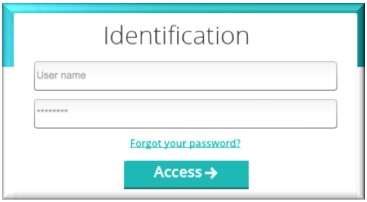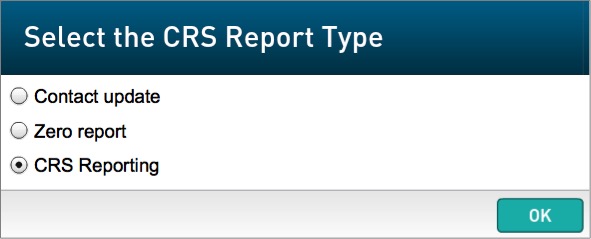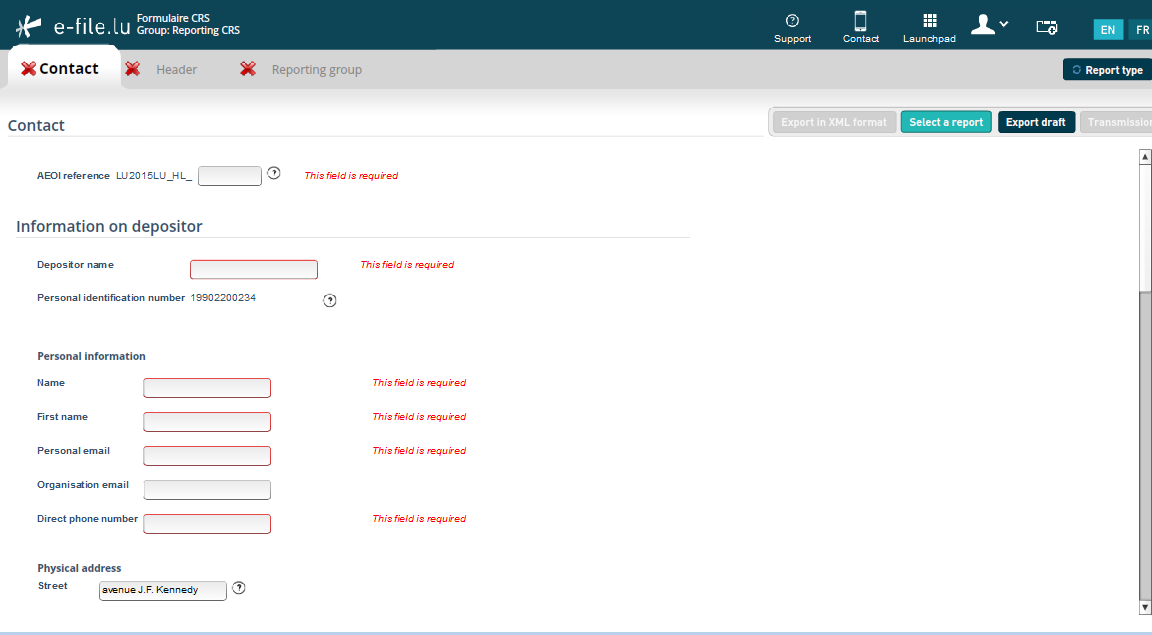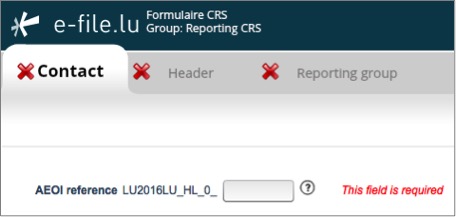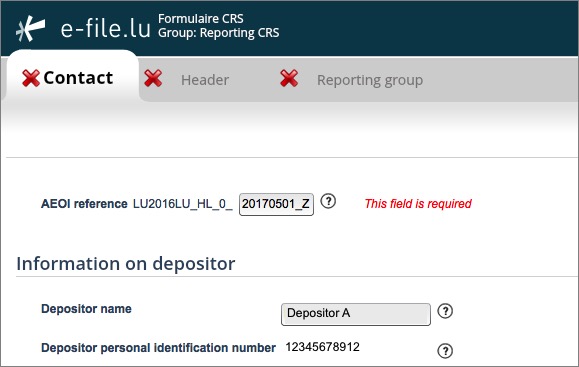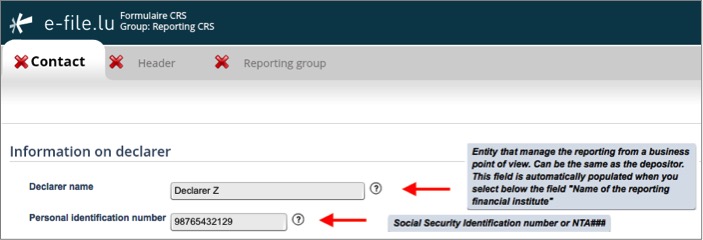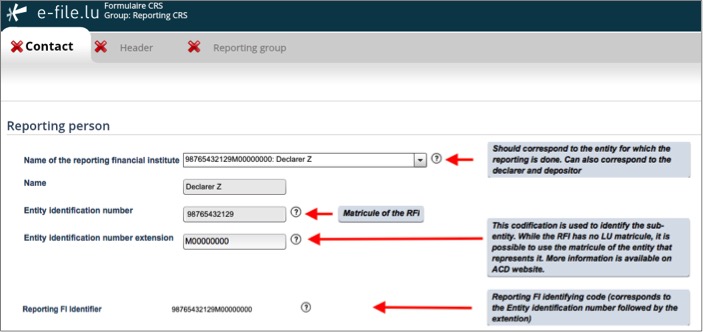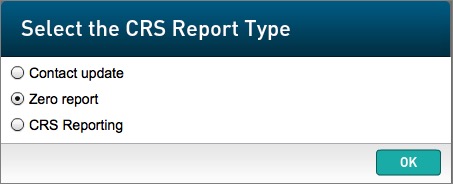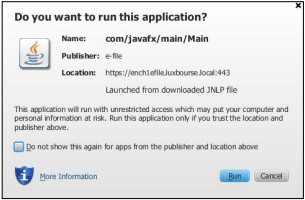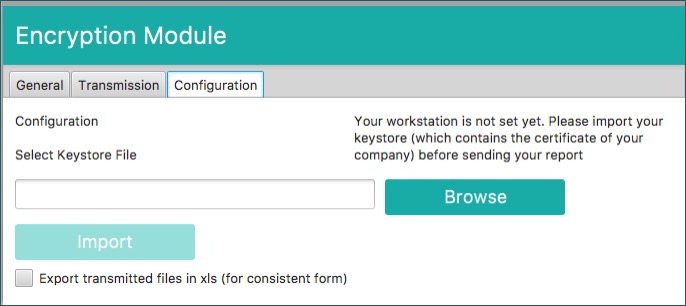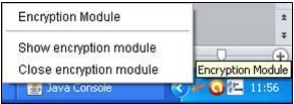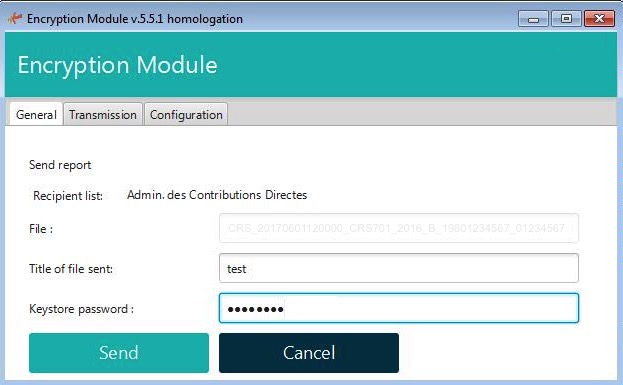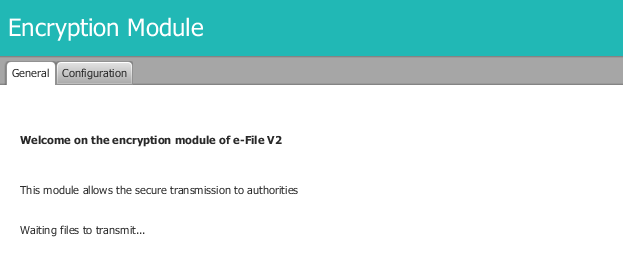Difference between revisions of "CRS Manual"
| Line 198: | Line 198: | ||
=== Setup of the e-file v2 encryption module v2 === | === Setup of the e-file v2 encryption module v2 === | ||
1. Complete the form [[File:GreenIcon.png]]. | Step 1. Complete the form [[File:GreenIcon.png]]. | ||
Result: all ticks become green | Result: all ticks become green | ||
| Line 207: | Line 207: | ||
2. Click the [[File:Transmission.png | border]] button. | Step 2. Click the [[File:Transmission.png | border]] button. | ||
'''Result:''' the EfileCrypto.jnlp file is generated. | '''Result:''' the EfileCrypto.jnlp file is generated. | ||
| Line 220: | Line 220: | ||
3. Click the Open button of the EfileCrypto.jnlp file [[File:Jplg.jpg]] | Step 3. Click the Open button of the EfileCrypto.jnlp file [[File:Jplg.jpg]] | ||
'''Result:''' the window below opens | '''Result:''' the window below opens | ||
| Line 229: | Line 229: | ||
4. Click the [[File:RunButton.png | border]] button | Step 4. Click the [[File:RunButton.png | border]] button | ||
[[File:JavaEfileWindow.png | border]] | [[File:JavaEfileWindow.png | border]] | ||
| Line 243: | Line 243: | ||
5. The encryption module has to be configured when it is used for the first time (or after each Java update). | Step 5. The encryption module has to be configured when it is used for the first time (or after each Java update). | ||
The path to the keystore has to be selected with the [[File:BrowseButton.png | border]] button and the key (locally or on a server) will have to be imported with the [[File:ImportButton.png |border]] button : <br/> | The path to the keystore has to be selected with the [[File:BrowseButton.png | border]] button and the key (locally or on a server) will have to be imported with the [[File:ImportButton.png |border]] button : <br/> | ||
| Line 259: | Line 259: | ||
6. Return to the CRS Form (Report Generator) screen | Step 6. Return to the CRS Form (Report Generator) screen | ||
- Click the [[File:Transmission.png | border]] button | - Click the [[File:Transmission.png | border]] button | ||
- Enter a "title of file sent" | - Enter a "title of file sent" | ||
| Line 267: | Line 267: | ||
'''Result''': as the configuration of the encryption module is finished, the General Tab of the Encryption Module will be displayed directly. | '''Result''': as the configuration of the encryption module is finished, the General Tab of the Encryption Module will be displayed directly. | ||
[[File: | [[File:CRS Encryp.jpg]] | ||
'''Note''': | '''Note''': | ||
Revision as of 08:02, 17 April 2017
Introduction
The Luxembourg Tax Authority (Administration des contributions directes (ACD)) published on 6 February 2017 the ECHA - n° 4 Circular. This Circular describes the format and procedures of the Common Reporting Standard (CRS) that Luxembourg Reporting Financial Institutions (RFI) will have to follow according to the CRS Luxembourg law, 24 December 2015.
Manual filing through e-file v2
Environment
Step 1: Select your environment
Production environment : https://www.e-file.lu/e-file/
Homologation environment (Test) : https://homologation.e-file.lu/e-file/
Login
Step 1: Enter your e-file login credentials (user name and password) and click the Access button
IMPORTANT: If you do not have an e-file user account or if you do not remember your password, you might contact your e-file administrator of your company.
Access CRS form
Step 1: Click on the Report Generation icon
Step 2: Select Formulaire CRS
Step 3: Select CRS Reporting
Result: the CRS form opens
Complete CRS form
Contact tab
AEOI reference
- This field has to be completed with a unique identifier.
- The ACD recommends to use a "timestamp", a digital counter or a "GUID" (Globally Unique Identifier).
- Specification examples: only capital characters (A-Z), number 0-9, must be unique, etc.
- The ACD asks not to include confidential data in the identifying elements.
Cf. ECHA - n° 4 of 6 February 2017, page 21-22.
Information on depositor
- Depositor name (pre-filled): The Depositor is an entity (legal or natural person) that is in charge of filing the CRS reporting to the ACD (e.g. Service provider). The depositor and the declarer may be the same entity. Cf. ECHA - n° 4 of 6 February 2017, page 10.
- Personal Identification Number (pre-filled): The Depositor needs a Personal Identification Number (Luxembourgish Matricule Number also known as CCSS code) to be able to file the report.
If the Depositor does not have a Luxembourgish Matricule Number, he has to contact the Bureau de la retenue d'impôt sur les intérêts to obtain one (Form 914F).
-by mail: aeoi@co.etat.lu
-by phone: Phone book_Bureau de la retenue d'impôt sur les intérêts
IMPORTANT: all pre-filled data have to be communicated to Fundsquare in order to be integrated in Fundsquare's database and to be available in the CRS form
Consult our Onboarding/Update process FATCA/CRS for more detailed information.
Send mail to: OnboardingFatcaCRS@fundsquare.net
Information on declarer
The declarer may be the RFI or an entity, e.g. a management company, managing the reporting from a business point of view.
The ACD needs contact details of a person who would be able to answer business questions regarding the report.
Cf. ECHA - n° 4 of 6 February 2017, page 10
Reporting person
The Reporting Person is the Reporting Financial Institution (RFI) that is subject to the CRS Reporting.
- Name of the reporting financial institution: Select the entity in the drop-down list for which the reporting has to be done.
- Name: name of the RFI (pre-filled once the RFI has been selected)
- Entity Identification number: The Identification number is the Luxembourgish Matricule number of the RFI (pre-filled once the RFI has been selected)
- Entity Identification number extension: the extension of the Luxembourgish Matricule number (pre-filled once the RFI has been selected)
If a sub-entity wants to submit a CRS reporting to the ACD and does not have a personnel number, it puts the parent entity's number in the Entity Identification number field and an additional identifier in the Entity Identification number extension field. For example, a sub-fund that wants to report directly, can enter the umbrella number (= tax identification number available on the subscription-tax returns) in the Entity Identification number field and the sub-fund number (CSSF code of the sub-fund) in the Entity Identification number extension field.
IMPORTANT: instructions published on the ACD website should be followed in the event that the Luxembourg Financial Institution has no Luxembourgish matricule.
- Reporting FI Identifier: It is the concatenation of the Identification Number and Identification Number Extension (pre-filled once the RFI has been selected).
IMPORTANT: all pre-filled data have to be communicated to Fundsquare in order to be integrated in Fundsquare's database and to be available in the CRS form
Consult our Onboarding/Update process FATCA/CRS for more detailed information.
Send mail to: OnboardingFatcaCRS@fundsquare.net
Zero Reporting
A "ZeroReporting" message is a message stating that the Luxembourg reporting financial institution has no data to report for the relevant tax year.
Unlike FATCA, the ACD has decided that filing a "zero reporting" is not mandatory.
Cf. ECHA - n° 4 of 6 February 2017, page 17
Step 1: Select Zero Report
Result: the Message header opens
Important:
-The RFI should not declare any Account Report in a Zero Report.
-The Zero Reporting has to be filed to the ACD. It will not be communicated to a particular JSD ("Juridiction soumise à déclaration").
-The Zero Reporting will be rejected if the Luxembourg Financial Institution has already transmitted data via a new data message but this data has not been canceled via a correction message. All declared data must be canceled before sending a Zero Reporting. Otherwise, the error "80009" is returned.
Cf. ECHA - n° 4 of 6 February 2017, page 17
Export - import files - save work in progress
1. Click this button to export the final report in XML format. The file will be saved on your hard drive and is available for sending to the Regulator. This button will only be available if the green tick ![]() appears in every section of the completed form.
appears in every section of the completed form.
2. This button allows you to upload an existing XML report from your network or hard drive into the report generator.
3. Work in progress on a report has to be saved with this button. The exported .xml file will be called DRAFT_filename.xml and cannot be uploaded for filing. It can be imported onto the tool for later use. Only final reports will carry the correct naming convention for submission to the Regulator.
4.If green ticks ![]() appear in every section of the completed form, the Transmission button will become available.
appear in every section of the completed form, the Transmission button will become available.
File transmission
Setup of the e-file v2 encryption module v2
Step 1. Complete the form.
Result: all ticks become green
Step 2. Click thebutton.
Result: the EfileCrypto.jnlp file is generated.
IMPORTANT: this file has to be downloaded (if you use the application for the first time) locally on your computer and must be opened to launch the Encryption Module.
Note: the Encryption Module is a Java application. For security reasons, this module aims at encrypting documents before they are sent to authorithies. It is also used to decrypt documents and feedbacks.
Java version 1.7.55 is a prerequisite for the installation of the e-file v2 encryption module.
Step 3. Click the Open button of the EfileCrypto.jnlp file
Result: the window below opens
Step 4. Click thebutton
Result: the Encryption Module is launched
Important: It is possible that the pop-up blocker does not allow .jnlp files to be downloaded. Please ask your IT deparment to allow pop-ups from https://www.e-file.lu/ .
Step 5. The encryption module has to be configured when it is used for the first time (or after each Java update).
The path to the keystore has to be selected with the ![]() button and the key (locally or on a server) will have to be imported with the
button and the key (locally or on a server) will have to be imported with the ![]() button :
button :
Once the key has been imported, the access to the keystore is memorized by the application.
In order to be more user friendly and to speed up the sending process, the encryption module will then run as a back ground process on your desktop.
If you need to end the process, right click on the icon in the taskbar and select “Close encryption module” :
Step 6. Return to the CRS Form (Report Generator) screen - Click thebutton - Enter a "title of file sent" - Enter the keystore password
Result: as the configuration of the encryption module is finished, the General Tab of the Encryption Module will be displayed directly.
Note:
-the file name is automatically generated and compliant to the ACD file naming convention.
-the ![]() button is now available and the report can be sent. A pop-up window will confirm the transmission.
button is now available and the report can be sent. A pop-up window will confirm the transmission.
Error messages
Message: The process takes too much time. Please restart the encryption module.
The error message occurs when the encryption module is not started in time.
Please check that the pop-up are enable for the site https://www.e-file.lu.
When clicking the "Transmission" button the file EfileCrypto.jnlp should be downloaded in order to launch the encryption module. You have to open this file with Java Web Start Launcher to run the module.
Message : Waiting files to transmit...
This error might occur when there is a connection problem between your proxy and the encryption module V2.
Close the encryption module :
Open the Java console (Cf. Encryption Module_6.8 Show the console in case of other Java issue) and check the logs.
If an error 407 appears, it means that the encryption module is not able to authenticate on your proxy.
As a consequence all communications with E-file are blocked.
In that case the solutions to resolve this problem are the following :
- Add the group "NoAuthenticated exception group" to your proxy for www.e-file.lu
- By-pass the proxy for the communication with www.e-file.lu
For more information please call the Helpdesk.
